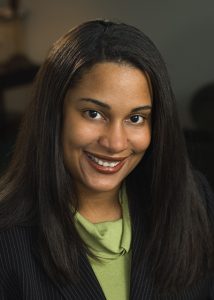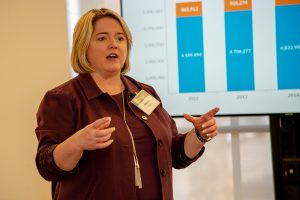Online learners need a community, too. Online education is becoming increasingly popular, but providing a quality learning experience requires more than just putting content online. A session at the conference examined the elements of successful online programs.

Rajenie Somra put off earning her Master of Social Work once she had twins. But in 2016, at age 48 and with her daughters in high school, the Long Beach resident decided it was time for her to go back to school.
“But I still wanted to be physically there for the girls while they were going through their last years of high school, so I wasn’t ready to be on campus all semester; I still needed flexibility,” she said.
Somra enrolled in a then-new hybrid online Master of Social Work (M.S.W.) program at Adelphi, which combines online learning with face-to-face class time. She said this gave her the advantage of being part of the Adelphi community, including access to the University’s library, while also being able to do most of her assignments at home. She’ll graduate in May as part of the first group of students in the program.
The online M.S.W. is one of several programs for distance learners at Adelphi. The University began offering these programs in 2013 when it launched an online Master of Science in Nutrition, according to Emilia Patricia T. Zarco, M.D., chair of the University’s Senate Committee on Academic Innovation in Technology.

Dr. Beverly Araujo Dawson, professor and director of the online M.S.W. program
Currently, there are fully online master’s degree programs for nutrition, emergency management, sport management, healthcare informatics, social work, educational technology and art education. The University also offers online undergraduate degrees in emergency services administration as well as online certificates in autism, English to Spanish translation studies, and emergency management.
Dr. Zarco said that both undergraduate and graduate students are interested in online learning at Adelphi. The number of Adelphi students taking online courses has doubled from 2013-2014 to 2017-2018. More than 285 courses in either a full-online or blended format were offered during that time.
Online learning first appeared almost 30 years ago, and the quality of instruction, and the way information is presented, has also been evolving ever since, according to Whitney Kilgore, Ph.D., who is co-founder and chief academic officer of iDesign, which helps colleges and universities harness the potential of emerging technologies to design courses and degrees that make an impact.
“In the early days of online learning, the focus was in putting content online instead of designing a student experience,” said Dr. Kilgore, who presented the workshop “Connecting the Dots: Improving Student Outcomes With Great Instructional Design” with Dr. Krista Galyen at the recent Teaching and Learning Conference. “It’s not as simple as taking what you do in the classroom and digitizing it. Instead, a focus on learner experience design and on true white glove concierge support for faculty as they go through a critical shift from teaching face-to-face to teaching online is required. Technology keeps evolving, so schools have to be creative and innovative about how they teach online subjects.”
When schools aren’t focused on the quality of the student experience and don’t take a creative approach to online teaching, Dr. Kilgore explained, data shows students’ completion rates decrease because they tend to feel isolated and unsupported. Dr. Kilgore’s company has been working with Adelphi faculty to design online learning experiences that increase overall student learning outcomes.
The hybrid model that Somra has been enrolled in was developed by Beverly Araujo Dawson, Ph.D., professor and director of the online M.S.W. program in the School of Social Work, in collaboration with social work faculty members and administrators. It started with three students and now has 42, including students from out of state as well as upstate New York.

Dr. Whitney Kilgore of iDesign explains that a focus on the learner experience is critical to the success of online programs.
“We thought it was important to develop a program that was true to our mission, to be student-centered and offer an alternative that could provide support for students but also offer them the flexibility that online education provides,” Dr. Araujo Dawson said. The hybrid social work program accomplishes those things by having classes meet on campus twice a year and by including weekly live sessions, when students log in and use webcams to see each other and the instructor.
“These classes include polls to elicit participation in the classroom and breakout groups, similar to what you’d do in a classroom,” Dr. Araujo Dawson explained.
The instructors—mostly full-time faculty—create a supportive online learning environment and interact with students between assignments, posting articles that relate to the topic of that week or asking students questions. Programs also cover practical career issues, offering students a professional development seminar during their first year of the program. And they offer other ways to get students involved.
“I was able to become more involved in the school community when I applied to be a graduate assistant,” Somra said. “It gave me the chance to assist one of my professors and also to moderate the program’s social media pages. Then, this year, I was selected to be part of the Practice Committee, which has been an invaluable experience.”
She said she has another reason to come to campus: One of her twins, Naya Ghirdarry, is now an Adelphi first-year psychology major—currently taking traditional courses.
For further information, please contact:
Todd Wilson
Strategic Communications Director
p – 516.237.8634
e – twilson@adelphi.edu